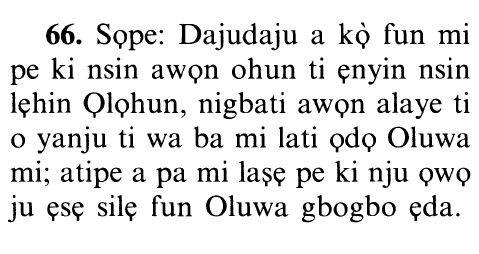40vs66
Select any filter and click on Go! to see results
قُلْ إِنِّي نُهِيتُ أَنْ أَعْبُدَ الَّذِينَ تَدْعُونَ مِن دُونِ اللَّهِ لَمَّا جَاءنِيَ الْبَيِّنَاتُ مِن رَّبِّي وَأُمِرْتُ أَنْ أُسْلِمَ لِرَبِّ الْعَالَمِينَ
Qul innee nuheetu an aAAbuda allatheena tadAAoona min dooni Allahi lamma jaaniya albayyinatu min rabbee waomirtu an oslima lirabbi alAAalameena
Index Terms
Click to play
Yoruba Translation

Hausa Translation
Ka ce: "Lalle nĩ, an hana ni in bauta wa waɗanda kuke kira waɗansun Allah a lõkacin da hujjõji bayyanannu suka zo mini daga Ubangijina, kuma an umurce ni in sallama ga Ubangijin halittu."
Asbabu n-Nuzuul (Occasions of Revelation)
The Prohibition of Shirk, the Order for Tawhid, and the Evidence
Allah says,
قُلْ إِنِّي نُهِيتُ أَنْ أَعْبُدَ الَّذِينَ تَدْعُونَ مِن دُونِ اللَّهِ لَمَّا جَاءنِيَ الْبَيِّنَاتُ مِن رَّبِّي وَأُمِرْتُ أَنْ أُسْلِمَ لِرَبِّ الْعَالَمِينَ ﴿٦٦﴾
Say: "I have been forbidden to worship those whom you worship besides Allah, since there have come to me evidences from my Lord; and I am commanded to submit to the Lord of all that exists.
Allah says, `say, O Muhammad, to these idolators, that Allah forbids them to worship anyone, such as these idols and false gods, except Him.'
يقول تبارك وتعالى قل يا محمد لهؤلاء المشركين إن الله عز وجل ينهى أن يعبد أحد سواه من الأصنام والأنداد والأوثان وقد بين تبارك وتعالى أنه لا يستحق العبادة أحد سواه .
"قل إني نهيت أن أعبد الذين تدعون" تعبدون "من دون الله لما جاءني البينات" دلائل التوحيد
أي قل يا محمد : نهاني الله الذي هو الحي القيوم ولا إله غيره " أن أعبد " غيره .
I'raab - grammatical analysis of the Qur'an
«قُلْ» أمر فاعله مستتر والجملة مستأنفة «إِنِّي» إن واسمها «نُهِيتُ» ماض مبني للمجهول والتاء نائب فاعل «أَنْ أَعْبُدَ» مضارع منصوب بأن فاعله مستتر والمصدر المؤول في محل نصب بنزع الخافض أي عن عبادة الذين «الَّذِينَ» مفعول به «تَدْعُونَ» مضارع مرفوع والواو فاعله والجملة صلة وجملة نهيت خبر إن والجملة الاسمية مقول القول «مِنْ دُونِ» متعلقان بحال محذوفة «اللَّهِ» مضاف إليه «لَمَّا» ظرف زمان «جاءَنِي» ماض ومفعوله «الْبَيِّناتُ» فاعل مؤخر والجملة في محل جر بالإضافة «مِنْ رَبِّي» متعلقان بجاء «وَأُمِرْتُ» عطف على ما سبق «أَنْ أُسْلِمَ» مضارع منصوب بأن فاعله مستتر والمصدر المؤول في محل نصب بنزع الخافض «لِرَبِّ» متعلقان بالفعل «الْعالَمِينَ» مضاف بالياء
